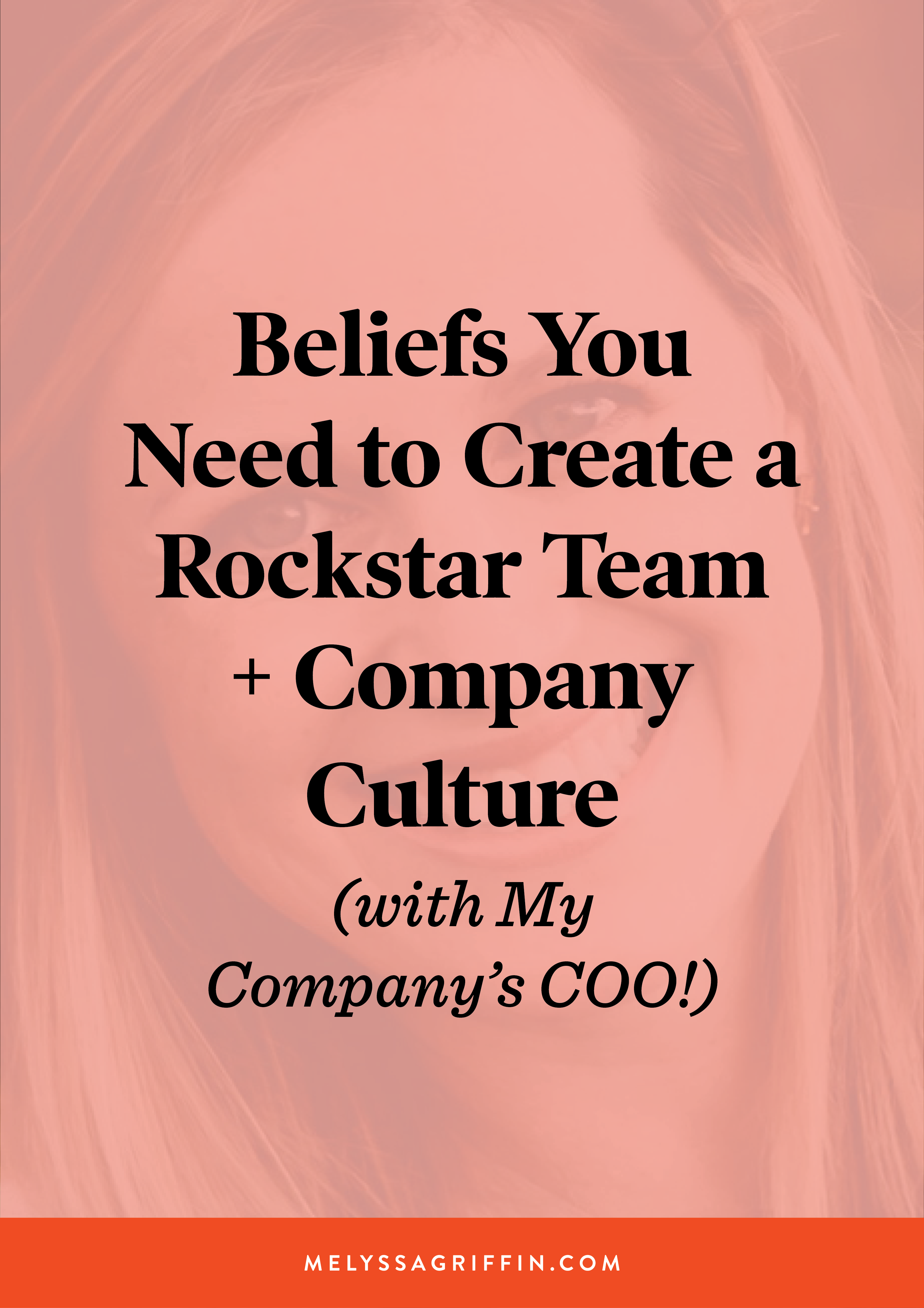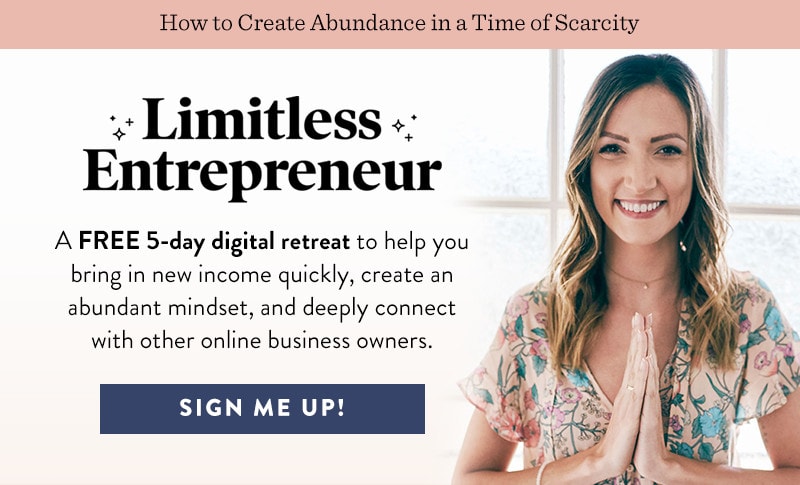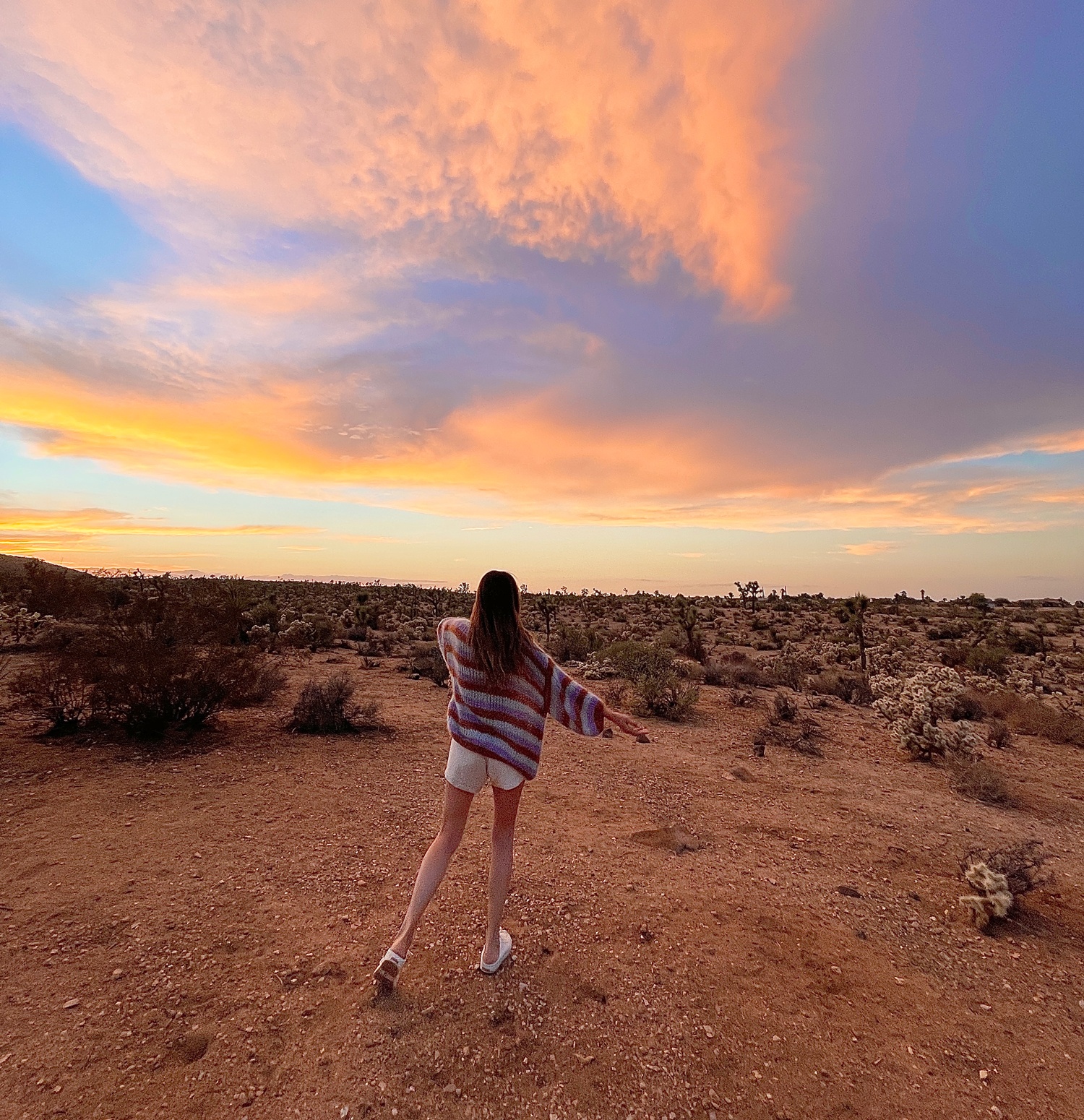Tune In to the Episode: Apple Podcasts | Spotify | Stitcher
Do you want to know what the number one thing is that’s keeping entrepreneurs from creating a rockstar team? It’s the beliefs they hold about building a team.
Let me introduce you to my company’s very own COO and operations wiz, Kat Herro! When it comes to hiring and growing a team, there’s no one I trust more than Kat. She is absolutely brilliant at understanding the key beliefs that help entrepreneurs create an amazing company culture and she’s helped coach hundreds of entrepreneurs on organizing their business, managing and hiring their teams, and setting up lasting and efficient systems.

In this episode of Limitless Life™, Kat shares how important it is to build a team to support you in your vision and the key elements that’ll help you design the right one (even if you feel like you’re not ready to hire yet).
I know that having a team that is fully aligned with my vision—and my values—has been instrumental in my success, and has opened the door to limitless potential in my business (and life!).
And I know that, with a willingness to let go of control, you can tap into something beautiful that’s waiting on the other side of the constant hustle and bustle in your business.
If you’re ready to step into a whole new level of leadership, let’s dive in.
Listen to the episode below:
This episode discusses topics like…
- How to build culture in a team (and what’s happed for us as a result)
- 4 beliefs and fears that may be holding you back from hiring a team and what you can do to overcome them
- Our approach to hiring from a values perspective and why it’s been so effective
- What our interview process looks like
- How to incorporate company values into your hiring process
- How to ensure team success and create an environment of communication
By the way, I created an entirely free, 5-day at-home digital retreat called Limitless Entrepreneur. It’s all about creating a new income stream in less than a week, as well as reprogramming the beliefs that are keeping you from a no-limits business and life. Click the image below to sign up, it’s free!

Links from the episode:
Check out Melyssa Griffin’s 7 Core Values
Discover Your Money Magnetism Archetype – Take the Quiz!
Register for the free, at-home Limitless Entrepreneur retreat here!
Follow me (Melyssa Griffin) on Instagram for honest conversations about business, mindset, and my life.
Follow the Limitless Life™ Podcast on Instagram for new episode releases and wisdom on how to live a life with no limits.
Learn about the Bold Abundance Mastermind.
How to subscribe + review:
Want to be the first to know when new episodes are released?
Also, podcast reviews are pretty darn important to the iTunes algorithm and the more reviews we receive, the more likely we’ll be able to get this podcast and message in front of more people. I’d be extremely grateful if you left a review right here letting me know your favorite part of this episode.
Share on social?
Did this episode help you expand what’s possible for your life or business? Do you think your social media followers may learn something, too? I’d be forever grateful if you shared it on social media. 🙂 If you do, tag @melyssa_griffin and @limitlesslifepodcast so I can repost you! Woohoo!
I’d love to hear your thoughts on this episode. Have you been dreaming of creating or growing your team? What are some beliefs holding you back from taking the next step towards hiring a new team member?
Thank you SO much for being here, sweet friend. I’m honored to walk this journey with you. See you in the next episode!
xoxo
Melyssa
Kat Herro
Hello! Your hair looks so good today!
Melyssa
Oh, thank you. I got a haircut yesterday, so it’s a little more voluminous now.
Kat Herro
Oh my gosh, it looks like really good like the curls – whatever they put in it.
Melyssa
Thank you. I know she did a good job but I’m like I wrote took notes so that I can try to recreate it.
Kat Herro
Oh, that’s good. I feel like sometimes people like when you get your hair cut. It’s like they know how to do curls or they don’t.
Melyssa
Yeah, I went to a curly hair-like hair care.
Kat Herro
Oh, cool. Did you go? Well? No, I think that one’s in Arizona. I remember you sent me that course of that girl.
Melyssa
Oh, yeah. I think you’re right. I think she is in Arizona. Um, no, not her. Have you heard of Deva? Like, DevaCurl products. There’s like, Deva salons. And so I think she’s like a deva salon person.
Kat Herro
Cool. What a cool niche.
Melyssa
And she loves curly hair. It was just nice to be around somebody who’s just like, just looking at my hair. She’s like, oh my god. It’s so amazing. Like, I just feel like I’ve never had that experience with a hairstyle or so it was just very heartwarming.
Kat Herro
Oh, I love that. Awesome. Um, speaking of like, I don’t know why curly hair made me think of this, but I watched the Dolly Parton documentary. Have you seen that?
Melyssa
No.
Kat Herro
I just like fell in love with Dolly Parton. I feel like she was just someone who like really owned who she was. And like…
Melyssa
One hundred percent.
Kat Herro
I just like, totally fell in love with her and her music and how talented she was. I was like, I bet Mel would love this movie.
Melyssa
Ooh, I’ll have a watch that. Yeah, I have a lot of respect for her. I feel like she’s totally just done her own thing.
Kat Herro
Yeah.
Melyssa
And just own who she is.
Kat Herro
Mm hmm. They like an old barbara walters documentary or like, interview with her. And they were like, she was asking her like, why she dresses the way she dresses. And her response was, Oh, well, it’s the easiest thing in the world to be fashionable. And I was like, Oh, that’s so true.
Melyssa
That’s amazing. I love that.
Kat Herro
Yeah. Anyways, made me think of you. Curly hair made me think of you, too.
Melyssa
So, yeah, I”m excited for our conversation? I think it’s gonna be really good. So some of the things and feel free to chime in on like, I think this will just be a casual conversation. It doesn’t have to be like, here’s the interview question. I like to just have a conversation anyways. But some of the things Oh, can you see me?
Kat Herro
You froze for like a second. But you’re good now.
Melyssa
Okay. My screen just went black. That was weird.
Melyssa
But okay, so some of the the beliefs and mindsets that hold entrepreneurs back from hiring, I think that’ll be a big part of the conversation. And kind of like, how to reframe those, or how to work through them so that they can actually start to make their first or next hire in their business.
Kat Herro
I wrote down speaking of that, like, four different like, beliefs. So I don’t know if you want to, like have notes on it, or if you want it to flow, but just like the ones that I see so much, are I can’t afford to hire someone. It’s hard for me to give up control. My employee always drops the ball, and I don’t have time to train someone. But I’m sure there’s more to but those are I feel like I hear those a lot in like the groups. Mm hmm.
Melyssa
Yeah, cause they all like go with some core beliefs like “can’t afford” is scarcity, control is like trust, and you know, all of these things, and then yeah, “drops the ball” is support and receiving. So I feel like…
Kat Herro
and also like, radical ownership, like, I know that you have about that all the time, because I was like, they always put you know, putting it on someone else. And it’s like, their fault when it’s like, oh, who hired this person? Or who trained them?
Melyssa
Yeah, yeah. Like, how did you contribute to? Like, how did you communicate or not? Yeah, I feel like we could have a full conversation about each of these and just like dig into each of them and just yeah, talk more about what the experience is like. To have that belief, so they really get it. And then we can talk about like, what does that actually mean? How can you actually show up differently so that you can hire people?
Kat Herro
Cool. I love it.
Melyssa
Anything else that you really want to touch on in terms of team or hiring? I mean, we could touch on things like culture, as well.
Kat Herro
Yeah, I know, you mentioned that. I just wrote a few notes on that. Like, if we wanted to talk about that. I mean, I guess that’s on hiring in general, like if you even say, like, my employee dropped the ball, like it for salt, like, who hired that person? But then also, like, how are you hiring based on your core values? Because like, let’s say you hired someone who maybe like if one of your core values is integrity, and then you didn’t flush that out in the interview process, there were not very so how are you just like hiring for the right person versus like, not into this task?
Melyssa
Yeah. Okay. I like that. So maybe we start by talking about core values, and why that’s so important for the hiring process.
Kat Herro
Mm hmm. Do you think we should talk about like, I mean, I think it would be interesting to like, how you came up with our core values and why they’re so important to you? Because I feel like it’s such a boring word, like, core value. But they’re so like, pivotal to like, who you are as a person who we are as a company, how we hire how we show up. So maybe we could like dive into that a little.
Melyssa
Yeah, I like that idea. Let me pull ours up, too. So I have them in front of me.
Kat Herro
And I know you’ve spent so much time like working on them. And they feel like, do you know, like when you said that? Your friend Ali was like, This is my soul on a piece of paper. Like sometimes like, that’s Melyssa’s soul.
Melyssa
I know the core values page is like my favorite page on the website.
Kat Herro
I love it too.
Melyssa
Yes. Okay. Anything else? So, core values in terms of hiring, and then we’ll go into the beliefs and mindset about hiring.
Kat Herro
Cool. Sounds good to me. I know you. Like you would talk to me about our interview process. But I feel like maybe that would get too long or like not needed for?
Melyssa
Oh, that’s right. We did. I mean, I
Kat Herro
It could kind of tie into core values, like how do you hire based on core values? And we could talk about our interview process.
Melyssa
Yeah, because some of our core values are self expression is sacred.
Kat Herro
I mean, without giving away like an interview question, I don’t think we’ll be interviewing anytime soon. But we could talk about, like, one of ours I forgot is something around abundance kind of, or let me pull up our core values, too.
Melyssa
I think even something that could be cool is telling them how we ask people to dress up as their highest self, which is reflective of the self expression value that we have.
Kat Herro
Oh, and we ask questions directly on their self awareness.
Melyssa
Yeah. Um, yeah, which is our third core value.
Kat Herro
Oh, possibility instead of scarcity. I was gonna say we, I know if we want to say the question that we asked. Well, we asked about, like, what has social distancing, like this time of social distancing brought up for you? And like, is their general slant very negative, or is it like, have also been a time for reflection?
Kat Herro
But, I also don’t want to be like some for some people. It’s been a really poopy time.
Melyssa
Yeah, that’s my only thing. I also want to avoid using words like negative and positive just in terms of… but I like the idea of sharing some of those for the interview process, and how they reflect our values. And that’s really cool.
Melyssa
Cool. Yay. Okay.
Kat Herro
Let’s do it.
Melyssa
So I’m here with my COO Kat, who is in charge of our team, hiring the team, managing the team, among many other things that she does inside of the business. And so I wanted to bring her in today because she’s just such a whiz at understanding the mindset that goes into really having a strong team and especially like, she really gets what the experience is like before you ever hire someone, too, like the the beliefs and the fears that a lot of people can feel before they actually end up hiring somebody that will hold them back for maybe years from growing their team and therefore growing their business. So, Kat, welcome!
Kat Herro
Hello. I’m so excited to be here. From behind the scenes, pulling the curtain.
Melyssa
Yeah, Kat is so instrumental in my business. She’s been with me for three years and she’s so phenomenal. So I’m excited that y’all get to meet her today and just learn about her genius brain when it comes to operations and hiring and mindset and coaching, too. So, the first thing I know we want to talk about is, I mean, this whole conversation will be about team and how to reconstruct your mindset and your beliefs so that you actually feel confident in hiring a team instead of afraid and like putting it off because of so many things that you’re afraid might happen if you actually bring somebody on in your business. So let’s talk a little bit first about how we approach or how any business could approach hiring from a values perspective.
Kat Herro
Yeah, that’s such a good question. I feel like we were talking about this earlier. But I feel like the word even like core values is so stuffy and sound so like corporate and like ran, doesn’t even sound like it’s something that you need to have. But, um, when we think about our core values, and I know, like, Melyssa spent so much time creating our core values, it’s really like the soul of the company, how we operate, what the culture is, how we hire, how we reward employees, really everything. So it’s so pivotal to our hiring process, that we encapsulate our core values in the interview process in the entire process, just to ensure that this person, not only is going to like kick butt in the tasks that they do, but also that they’re really good fit for our company culture and the cohesion of our team. So Mel, I know, you’ve spent so much time creating our core values, too, I would love if you could like, share a little bit about our core values, and also how you came up with them. Because, again, it sounds so corporate and like, you know, like our core values are integrity, even though that’s a very important one. But it’s like, what does that even mean? Like? How did you come up with them?
Melyssa
Yeah, that’s a really great way to think about it. And I do agree that core values, it has this almost corporate feel, where it’s like, the basic core values that everyone should have, feels like that. And I think what’s really important when you’re thinking about the values of your company, is that you can create what ever values you want, like what like you said, it’s the soul of the company. So whatever you want the soul of your business to be, it can be that doesn’t have to follow the same core values is like apple or Amazon, because you think that it needs to have this corporate protocol or something. So some of our values are things like “Self expression is sacred,” and “We actively work to dismantle systems of oppression,” and those are our values, because that’s part of the soul of what kind of community and company we want to create, even if it’s different than other companies out there, or maybe, is a turnoff to some people, maybe some people see our value of like dismantling systems of oppression and think that that’s too too much, or, you know, but but that’s our soul. And that’s what we want to be true to within our company.
Melyssa
So, I think that for a lot of companies, and maybe especially companies that are information product based, that could be a stretch, but I think companies like that will often reflect the values of the owner, the CEO. As I was creating the values for our company, a lot of them I mean, I tell Kat, sometimes that this is my favorite page on our website that has our values, because it feels like me in a page, you know, like, it feels like my own values that I would want to put into a company or that I’d want to live my own life by so I think there’s that blend of figuring out what your personal values are first as a CEO, and then how you want those to be reflected inside of your company and also in your community. If there’s anything else that you want your community to specifically reflect to. Then you can also consider collaborating with other people inside of your company, if that’s something that feels good to you when you’re creating your values of like, here’s what I’m bringing to the table. And then what else do you all see for this company, too, and how we can show up in a way that really serves people. But yeah, my biggest advice would be, have fun and don’t, don’t abandon who you are, because you think you need to create values that look like somebody else’s, just create values that are really the soul of your company. And that will guide you in the direction you want to go in.
Kat Herro
I love that and I love our values page two on our website, because it is fun. Like it really you get like a total feel for who we are as a company and what we stand for and even what you are about as a person. I just feel like it really highlights that whole process. So I know when we’re hiring. It’s really important to have Based on your core values, and that’s a question we get a lot in our mastermind is like, so how do I hire someone like, here’s my values like now what? And so we kind of have a unique interview process that we interview for the position to make sure that the person is qualified and understand how how to do certain tasks, and understand the role. But then we really dive into values, we dive into certain questions that help us get to know the human as a human. And we kind of like have our interviews split up into sections, and they’re really fun. I think they are I love going to.
Kat Herro
If you could tell us tell us more about our interview process, like when we’re interviewing people, like some of the things that we asked them to do and how it reflects our values.
Melyssa
You’re so funny, because this is supposed to be me asking you the questions. How did this become about me?
Melyssa
Well, real quick, if anybody wants to check out our seven core values for our company, you can go to melyssagriffin.com/values. And I’m going to flip that back on you. I do think we have a really unique interview process. I think people really enjoy going through it, even if they’re not selected for the position. And it’s really crafted around the values that we want our team to show up with. So I, can I flip it back on you?
Kat Herro
Yeah! 2 things that popped into my head are my favorite questions on the culture questions is we ask people to show up to the interview dressed as their most limitless and authentic selves.So, whatever that expression is for them, we want to see that in an outfit. And it’s so fun and Melyssa and I also dress as our authentic selves. So we also set the stage of them feeling comfortable, like they’re not on show or something. We all share why we selected our specific outfit. But I love it, you learn so much about someone – what’s important to them, their creativity, how they see their real self. It’s such a cool question and I think it kind of sets the tone for the interview right away of what our company is all about. Then we also ask them to bring a sacred object, which is really special. Something that’s tangible that is really meaningful to them and then we share stories about why we selected that specific object and kind of how it is meaningful to us as human beings.
Melyssa
Yeah, yeah. And that those two activities – those are some of my favorite parts of the interview process – but those two activities are really reflective of one of our values, which is “Self expression is sacred” and how in a normal interview process – we’ve had people who come to interviews wearing like, almost costume-esque things as their most authentic self. And it’s so cool! People just showing up really authentically in their self expression, instead of thinking they have to come in like a blazer or something like that. And so that is like our values in action, where even before somebody joins our team, they can see how we value self expression and authenticity versus like, the corporate buttoned up kind of atmosphere.
Kat Herro
It is so fun, too. I remember we’ve had people like show up dressed as unicorns, or in so many unique outfits. And yeah, and I also think that’s something that’s cool about our interview in our culture of our company, too, is that we participate as well. Like, we want people to know that we’re a team and we do things together. And it’s not just like a horse and pony show, as they’re like, on display for us that it’s like a conversation that we have together, we kind of set the tone for them feeling comfortable and feeling part of our culture right away.
Melyssa
Yes, so true. Yeah, I think there’s definitely something to be said, as leaders of a company that you kind of have to go first. Like, you can’t just expect your team to know what you want of them, you have to show up modeling the values that you want them to represent and like be the culture embody the culture that you want your team to have. I know one of the other things that we talk about in our interview process is “Where’s a limiting pattern you see in your life that you’re working on, or a belief that’s holding you back?” and getting people to talk about things that maybe you normally wouldn’t in an interview where you want to show up and project this image of perfection, but one of our other core values is your success is never greater than your self awareness. And we want to see, do the people who are joining our team have self awareness and are they in tune with where they’re growing Are they sloughing off the places where they can grow more or tap into themselves in a deeper way?
Kat Herro
I love that question. It’s so much deeper than the stereotypical interview question of “What’s your weakness?” It’s so much deeper, because you see the cogs spinning as soon as you ask it. Because it’s like, “Oh, I had prepared in my head this question, but now you asked me this one.” And then you usually get a very beautiful, truthful response and something that they’re really working on in their life that they’re figuring out right now.
Melyssa
Yes, yes. And I think something that kind of aligns with our values, too, in that way is like, you can kind of tell when somebody’s giving the answer of reframing their weakness as a strength or like, barely touching the surface on like, something that they’re working on, because it’s an interview. And because they or maybe just because they haven’t explored themselves that deeply yet. And I think we actually look for people who are willing to share more deeply about the truth of what they’re encountering within themselves. And like the limitations they’re putting on themselves, or the fears and beliefs and patterns that they’re dealing with. We actually, like when somebody’s super honest about some of the stuff they’re dealing with, versus trying to make it sound like this perfect sort of image. We value that in people.
Kat Herro
Definitely, I mean, I think that like goes back to like Brené Brown, but it’s like vulnerability really creates closeness, in a team culture to a creates a space that people feel safe, that they feel like mistakes, quote, unquote, mistakes can be made, and that they can just show up as their real self. So like when we set that tone right away in the interview, and when we hire strategically based on how someone shows up, and is in that moment that we have such greater success on our team with cohesion, and how we all show up together embodying these values.
Melyssa
Yes, exactly, exactly. And let’s, before we dive into, like, the mindset behind this fear a lot of people have of hiring people in their business or growing a team, can we talk a little bit about culture? What does that look like inside of a company? How is that important? Even if you have one person on your team? Or even if you have no one on your team right now, like thinking of your company as having a company culture? Why is that so important? What does that look like?
Kat Herro
Like culture is like, the lifeblood and the personality of a company. And it’s so important, because it just sets the whole tone of people’s work environment, what they do and what they’re working towards, and why they want to show up every day towards reaching this common goal. I love how it really works in our company, where Melyssa wrote the core values and really set that tone. Then, I also totally agree and embody the core values, but then I help take those and run with it and make sure our team is also embodying them and understands them, and that we’re showing up in that space. So our team also has permission to show up from that space. But I really think it just sets the tone for everything that you do collectively together as a team and what you’re working towards, and what your day to day work environment is like, which is so important. That’s where you spend, like, majority of your waking hours is usually at work. So making sure that you are happy with what you’re doing, and that you really value the company that you work for, what they stand for is so so important to someone’s like well being.
Melyssa
Yeah, absolutely. And thinking about culture too. Like, I feel like it’s a top down kind of thing, like you, as the leader of a company have to embody the culture first before ever expecting anybody in your company to then also embody it. And I think that’s where a lot of people I don’t want to say go wrong, because I don’t really believe in in that kind of language, but like where they create some ineffective qualities. And I’ll say that in the culture of their company, like expecting things from their team without modeling it themselves. I forget this sometimes like I forget how much the team is looking to us as leaders for how are we showing up as sort of a model for how they think they need to show up like, maybe a couple weeks ago, I was talking to someone on our team. And I think I said something about how I’m working. I’m not working on Fridays anymore. And so I’ll get back to them on Monday or like I’m using Fridays as a way to carve out more spaciousness in my life. And her response was like such gratitude for the opportunity for her to embodies spaciousness within herself. And just being able to see that from me and then thinking that that gives her space to embody that as well. And I take that for granted a lot as like a leader of a company that other people are looking at me, if I’m overworking or if I’m working on a late night or like a weekend or something, then the other people in the company are going to look at that and think, well, maybe I need to do that same thing. And one of our core values is about spaciousness and like freedom. And so yeah, that’s all to say that, as a culture, like how are how are you as a leader embodying that first, before expecting anyone else to do that? I think it’s important.
Kat Herro
And I love that example. Because I feel like it’s the opposite of what people think like, someone might think, “If I’m not working a million hours, my team won’t think I’m working hard enough. Or they, they might fear saying, I take Friday’s off, or I’m going to take a vacation because I really need it.” But it’s beautiful. Like it was the opposite opposite response that you receive from our team, because that’s the culture that we set, and they were happy for you. And they probably saw permission in their life where they can create more spaciousness and how it’s something that we really value. I know even that question was just asked of me in our mastermind, where someone asked, I know you and Melyssa value, spaciousness over the hustle culture. So how do you create that within your team? And I was like, well, like exactly what you said, it starts top down, it starts with Melyssa and I and so I don’t have slack notifications on my phone, I log off at a certain time I take vacations. So those are just like even a few things that are so valuable for leaders to be so self conscious of what they’re creating.
Melyssa
Yes, 100%. And I think there’s a difference. I know there’s a difference actually, between like, logically believing something, and then actually integrating and embodying it. And so as you’re creating, if you’re listening to this, creating your values, kind of knowing the difference between what that looks like, like you can create values that you’re like, yeah, this is what I’m about. And this sounds good. And this is what I want my company to be. And then you also get to assess like, how are you actually showing up in living those values? Or is there room for improvement? Or is there a way that you can embody them more before ever expecting anyone else in your life to embody those too?
Kat Herro
Definitely. And it’s something to like, always check in on to like, you have these values, but making sure like you said that you’re living and breathing them. And sometimes you might slip in a few areas, and then, you know, you’re able to get back on track and step back into that space and embodiment, which is so important.
Melyssa
Yes, I’m glad you said that. That was on my mind, too. Because it’s not about like, beating yourself up when you’re like, oh, shoot, like, not living my values. Yeah.
Kat Herro
And I think that even from last week, like, I had a slack message up that said, I’m eating lunch quick. And again, like one of our core values is spaciousness. So like, re checking in with myself, like, how is that embodying to our team that I that we value, that they have spaciousness, that they take a lunch that they are present at, and enjoy and do the things in their life that they need to do? Even in that moment, like it, we’re not striving for perfection, but self awareness. And so I was able to, you know, realize that and then not have to show up from that space anymore. And realize that, again, like it starts with us as the management and the leaders of the team that we need, it needs to start with us before we can expect anyone else to show up from that space. Mm hmm.
Melyssa
And that’s such a great example, too, because sometimes we can think of like values and company culture is like the big stuff. But it’s really the the granular things that we do the tiny actions that we take and portray to ourselves into our team. That is what a culture is made of like that was just a slack away message, right? Yes. “I’m eating lunch quick!” Yeah. Instead of like I’m luxuriating in this lunch. I’m present to you, guys is such a small thing that maybe most people wouldn’t even have noticed. But it’s like, those are the tiny moments that, that make a culture and like you said, it’s not. It’s not something to beat ourselves up about. It’s just like a noticing so then you can make a different decision.
Kat Herro
Yeah, totally, totally.
Melyssa
So let’s talk about hiring. I know there are a lot of beliefs and fears that can get in the way of people actually hiring a team. So let’s just say that for anyone listening, maybe you don’t have a team yet. Or maybe you’ve got some people on your team, but you know that you could grow more and you’re holding yourself back from hiring and I will just say that having a Team is basically essential if you want to scale and grow your business, and probably one of the most important facets. In growing a company is also growing a team to help you because there’s only so much you could do by yourself. And you’re probably not an expert in all the things. So it’s quite essential. And yet, we all seem to hold ourselves back from hiring a team, to some extent, so can you share some of the beliefs or fears that often get in the way from people actually seeking out a team and growing the team? They know they should?
Kat Herro
Yeah, there’s so many. Just to reiterate what you said about why teams are so essential: teams equal freedom. You cannot do all the things alone in your business, and really be happy. Because you’re probably spending all of your time and all of your energy on sustaining this thing. And so, teams also give you so much freedom in your business and, and camaraderie and support with so many different things. But one of the biggest, like myths or misconceptions that I hear all the time, is I can’t afford to hire someone, which I totally understand. It’s kind of one of those places that’s coming from a place of scarcity instead of abundance, instead of like having a growth mindset of what’s possible. For me, when I have this team, it almost like is one of those statements that immediately says, “I can’t have this, therefore, I will not even pursue or talk about it, or even think that it’s something I can have.”
Melyssa
Yes, that is such a big one. And we’re not really talking about people who actually can’t like if you have zero… But there’s a lot of people out there who, you know, you could make it work somehow.
Kat Herro
Yeah and even with generating like monthly revenue, and you know, you’ve launched your product, or whatever it is, and you are creating income in your business.
Melyssa
Right, right. And even if it’s not like a lot of income extra per month, but it’s enough to hire someone and like, I think with that a lot of people seem to go into hiring with thinking like, I need to hire a full time person, right from the get go. It’s like you could hire somebody to work five hours a week, on emails. And it doesn’t have to be this huge expense from the beginning. So that it’s sort of like this self defeating thought before ever giving it an actual chance.
Kat Herro
Totally. And something that we do is almost like future past like, asking yourself the question of what is possible, if I have this type of support, that helps me with these revenue generating activities, and actually projecting, like, we could generate this much more revenue when we had this type of person, and then you kind of understand the investment that you’re making in a company. So it’s almost like the opposite of what you think like, once I hit this amount of revenue, then I will hire this person. It’s like, No, I want to hit this amount of revenue, which means I need to hire this person.
Melyssa
Yes, exactly, exactly. And I think I got this from, I want to say, Todd Herman, but he has this sort of scale of thinking about where you, as a leader of the company, are spending your time and there’s the $20 an hour tasks, the $100 an hour tasks, $1000 an hour tasks, $10,000 an hour tasks. Maybe the $10,000 an hour tasks are doing a webinar, or speaking at a conference or something like that, like things that really only you, as the leader of the company can do, and are probably the best use of your time, in terms of finances. And then the $20 an hour tasks may be things like responding to emails and customer service, and things that are obviously really valuable to the company, but not things that you necessarily need to be doing. And that aren’t the best use of your time as the leader of the company. And so thinking like, Where are you currently spending your time? And how can you begin to offload the lower dollar per hour tasks to somebody else, so that you could really be living in the the areas that are going to produce the most revenue for your business, and also the most enjoyment? Like, it’s not about revenue to but
Kat Herro
yes, yeah, totally, I agree so much. And it’s almost like, you need to shake up the environment. It’s like that whole phrase of like, What got you here won’t get you there. And it’s like, you need to change the environment to support growth. First, and I was like to think of it as like that friend that you have from your hometown who like left and went to New York City and just like blossomed into this like, and it’s because they like went into a different environment that actually supported their growth of them. And I totally think that with like companies, too, it’s like, you have to essentially change the environment. Maybe that’s bringing in new people to then support this, like the new you, the new company that you’re going to be Stepping into.
Melyssa
Yeah, I love that way of putting it. Yeah. Because the people you surround yourself with are such a important factor in who you are who you become. So that even extends to the team you work with. Absolutely. Yeah, really? Okay, so what’s another belief people have that holds them back?
Kat Herro
This one I hear so much. And I, I love it, because it’s like coming from such a place of why someone even became an entrepreneur. But it’s like, it’s hard for me to give up control. Like, they don’t want to let go of certain tasks or certain projects that they have, like, I’m really like, I’m designing my opt in pages, or whatever it is. And I totally understand this, because I do think a lot of entrepreneurs became entrepreneurs, because they really identify with control. And it’s something that’s important to them, and is maybe like a comfort space for them. But this one, like when I think of all the myths are things around hiring beliefs around hiring. I think this is like the work right here for sure.
Melyssa
Tell me more about that. Like how does that show up? As an entrepreneur? in someone’s business?
Kat Herro
It shows up in so many different ways. Like, first of all, with them, like not wanting to release certain certain things. But I think that another piece of why people become entrepreneurs is because their life and like mental well, being outside of, of work is also very important to them, and creating spaciousness, and if these are important to you, then you can’t do this alone. And with that comes releasing control. And I think that this is also such a beautiful thing. And I know, we talked about this in our loss your mind, but it’s like, with every decision you make, there is like a benefit to it. So if you’re deciding not to give up control, if you’re deciding not to hire and let people in that decision is also there’s a benefit to it, which is why you’re making it. And it’s probably because there is not a causing you to have any growth and communication, not having you step up into a new level of leadership. Having a team and growing your company, as you know, Melyssa, like it exposes so many wounds and places that you need to explore in self awareness. And all of that comes with releasing control, and really like stepping into this new version of yourself.
Melyssa
It kind of goes back to this idea of having values too. And I think even before you create your company values, creating your personal values, and those might be similar, but I think having personal values is really important too. Because like you were saying, as an entrepreneur, and maybe you could even constitute it as like a lifestyle entrepreneur, in a sense of like, wanting to have that balance and, and wanting to create a company that aligns with who you are, as a person and, and the lifestyle, you also want to make a living. And so it’s like, if you are unwilling to give up control in your company, and you feel like you have to do every single thing, because you’re like, well, I’m the only person who can do it. And I don’t want to have to rely on anybody else to do it, then you are probably sacrificing in some way your personal values and how those personal values would be reflected in your life, because you’re like white knuckling all the, the processes and the tasks inside of your business. So it’s kind of like, like this trade off of maybe you give something up, quote, unquote, that you’ve been doing that someone else can do for you. But for the sake of then having more time to like spend with your family or travel or just like meditate or you know, other things that you enjoy and that are good for you. So yeah, it’s like what you were saying, What’s the benefit of clinging to your business, I think of it as having a codependent relationship with your business and how that’s just as unhealthy as having a codependent relationship with a human being. Because you’re putting all of your worth into something else. And your your enjoyment and alignment is dependent on this other entity. And so how you can release some of that control and that that gets to be part of the work and the development for entrepreneurs.
Kat Herro
Definitely. And I love like that reframe that you have is also thinking on what’s on the other side of this for me, like you said, Is it a meditation practice or more spaciousness and time with my family? Or, you know, what are you gaining from allowing trust and surrender into your life essentially, by releasing the death grip that you have on certain pieces of your business?
Melyssa
Yeah, yes. And it can be so easy to when we think about like hiring someone and losing the control. It’s easy to go into the mindset of like what you’re losing. I’m losing Control, I’m not going to be the one writing the sales pages anymore, you know, and somebody else is going to do and that’s gonna be so weird. They’re not gonna get my voice, you know? There’s all these things that come up. And, and, yeah, it’s just like I’ve totally lost my train of thought, as I was saying that…
Melyssa
But yeah, just what is on the other side of, of that and thinking, here we go, thinking of the possibility of what’s possible when you release the death grip versus just what you think you’re going to lose. I think tha’ts a lesson for life in general,
Kat Herro
Totally. And I feel like so many ways that we show up in business, and even some of these beliefs around hiring, like mirror other places that you show up in your life and how, you know, that is working out for you. And so maybe it’s even digging deep into why you have these feelings of control where you first like, experience them, maybe where you first realized that or thought that seeking support is a sign of weakness, like maybe even diving that deep will help you like be able to release this belief that’s actually keeping you really small in your business and not helping you expand into building the company that you want to build and having the impact that you want to have.
Melyssa
Yes, yeah, 100%, I think support is a really big thing for a lot of entrepreneurs who maybe they learned that’s getting support is a sign of weakness, or asking for help or something, or maybe they just, we’re deeply unsupported in their life growing up, or they had parents that weren’t around, or they just didn’t feel like their ideas mattered to people. And so I think that kind of trauma leads a lot of people to entrepreneurship, too, because it’s like, I don’t want to have to depend on anyone else, except for myself. I’m independent. Right? And, and that’s beautiful in a lot of ways that can create a lot of people who have big ideas and get them done and, and that kind of thing. But then, at the same time, there’s like this opportunity to grow and to become aware, like you’re saying of where that’s coming from, and how it might be holding you back?
Kat Herro
Yeah, definitely. And that’s why it’s so important to ask yourself those type of questions that like peels back the onion, because someone could tell you a hiring strategy or say this isn’t true around hiring, but you’re never really going to let it soak in or be able to show up in a different way. If you don’t find whatever that is for you, like you said, whatever, you know, part of your past or upbringing, or how you’ve taken on the status quo society, if you don’t, like uncover what that is for you, then you won’t be able to release it.
Melyssa
Yes, I think you just like hit the nail on the head of what “mindset” really is, like, I think it can seem like, I don’t know, this habit, or how to get more done or be productive. You know, like, that’s what mindset is, but mindset is so much about how is your past and a lot of ways in forming how you’re showing up currently? And how is that actually possibly holding you back from the person in life that you want to be and have?
Kat Herro
Yeah. So true.
Melyssa
Ok. give us another belief.
Kat Herro
Okay, another one. I don’t know if this is a belief, but just it is a belief, actually. And it’s kind of just like a common phrase that you hear. And it’s like, my employee dropped the ball on this, or my employee can’t do this, or isn’t good enough at that, or, um, yeah, just like hearing about how their employee did not show up in the way that they wanted them to show up.
Melyssa
And, and with one caveat to that to have like, or I had someone in the past who was in this role, and they dropped the ball, or they didn’t do a good job. And so it’s almost like they’re scarred from ever hiring somebody, again, kind of assuming that everyone will have that same effect.
Kat Herro
Yes, totally. There’s definitely like old wounds around hiring faux pas that have happened in the past start and you know, instead of looking at them as a learning experience, looking at them as like a micro trauma, um, but I think, in general, people’s natural tendency, employees natural tendency is that they really want to succeed. I mean, it actually like when someone says you’re doing a good job, or you feel validated in what you’re doing, it releases dopamine, and makes you feel good, it makes you, you know, feel like you’re part of this thing that’s bigger than yourself. And so innately like I really do feel like our whole team wants to see Melyssa succeed, we want to see the company succeed. We want to see everyone on the team, including our leader be super happy. So something that I like to like kind of put back on this is like, as a leader, how are you giving them the ability to actually thrive in your company, because that’s your role as a manager or CEO of your company is to actually create a really positive environment for your team to survive like, even in the book traction, they say like the only The role of management is to essentially like, create an environment for other people to thrive and like do their work.
Melyssa
Ooh, I love that create an environment for other people to thrive. That’s cool. And that really goes back to how are you embodying the values and the culture that you want your company to have? And something that I think in terms of this whole, like, whenever I hear someone say, Well, my, my copywriter, and my Facebook ads person, my VA, they dropped the ball. And that’s why my launch failed. That’s why my business isn’t growing. That’s why this thing isn’t doing well, this project isn’t going well. Whenever I hear that, like we’re talking about, I just think of like, how have you as the leader? How have you contributed to that in some way? And I don’t think we ask ourselves that enough. And it can create a lot of blame on the person that’s working for you. Instead of seeing like, Where Where did I not embody my values? Where did I not communicate, because communication is such an interesting thing, that people are just really bad at. I think people are just really bad at it. And, and it’s, it makes sense. Because we never learned how to communicate, we just see it modeled from people like our parents, and assume that that’s what communication looks like when in reality, like honest communication, it takes work to learn how to do that, and to actually communicate your ideas and your feelings, other people. And I think, as entrepreneurs and as leaders of companies, it’s just as important to communicate with your team as it is to communicate with like your partner, you know, your romantic partner. And, like, let’s just say, with a romantic partner, if you’re sort of passive about your needs, and you’re hinting at what you want them to do, instead of explicitly being honest about this is what I need from you. And this is how I need you to show up in this scenario, right? Like being just honest and forthright about what what kinds of needs you have in communicating that to somebody instead of like inching around the topic and hoping that they just get it or they like, pick up on what you need based on your extremely passive communication and then noticing like, if you do that in relationship, how might you be doing that with your team, maybe you sort of inch at things that you want them to do or embody without actually being honest about those things that you want from them. And so I think a big part of it, too, if in the drops the ball conversation is like, how can you better communicate your needs and your standards and expectations? And continue communicating them? Like if you see something that’s not in alignment with what you need from them on your team? Like, how can you continue communicating with them about those needs, so that it’s super clear?
Kat Herro
Yeah, kind of expecting. And I love that like, correlation between like, communication with a romantic partner, and like, even just like how that could relate to your team, too. And I thought about that, too. When you said that example, “Oh, well, in the past, I had this employee who did this. Now I’m like traumatized and don’t want to, like give this part away or hire again for this.” But it’s like, think about how not addressing that wound and like diving to the depths of that and taking radical ownership of what went right and what went wrong with that hire. If you don’t do that, and like let’s see rehire roll. It’s like how can that person show up differently when you already have all these preconceived notions that they’re going to mess up, or you know that they are going to show up a certain way, because someone else did in the past, it’s like that type of energy going into a new relationship, because of an old wound can be so damaging to a team if you don’t like talk about it right away and kind of go through what went right and wrong with that past hire and kind of own it and then grow from it. Because I know, like, as an employee of a team of I came in, and Melyssa had all these scars of a past integrator that she had worked with, like, I would have felt like horrible right away, I wouldn’t have been able to show this my best self or be able, I feel like I was always like having to prove something, versus just being able to show up as myself. So I think that that’s something definitely to think about before you hire that position that maybe you have some wounds around that you’re you’re working on.
Melyssa
Right, right. And in the example that you just shared of like, if you had come on the team and I had had previous wounding around somebody dropping the ball in your role before, you wouldn’t have known that because I’d probably if I’m not communicating with you about what I need, I probably wouldn’t communicate something traumatic like that with you. So you wouldn’t know that you would just see the aftermath of like, me not trusting you or me not communicating with you or me having unrealistic expectations or something like that. And not knowing why and just kind of assuming maybe this is the way it is. That’s not really inspiration to do a good job, right? If you think somebody is always looking for the places where you’re not measuring up. So, yeah, I think it’s so important to just be open and honest with your team and communicate your needs instead of just expecting them to get it. That’s a big gap. Don’t expect people to get it if you haven’t told them what it is.
Kat Herro
Totally. And it might, you know, take some time for you to realize that, “O, yeah, I didn’t do this” and kind of, like dive into that, or this is why this happened. But again, like, this is like part of the work. Growing a team is not a hard thing. But it takes energy, because it’s a very worthwhile thing. And it’s an investment in your company. And it requires a new level of you and a new level of leadership.
Melyssa
A lot of people say that, running a business is one of the best opportunities we have for our own personal growth. And I think that’s so true. Because if you have a pattern in one area of your life, like in a relationship, or friendship or in your family dynamic, like that pattern shows up everywhere. And if you’re running a company, and then having a team and having big ideas and things that you care about, then those patterns will start to show up there too. So it’s kind of like, Well, you could ignore them and let them continue to fester for evermore. And like, we’ll see what happens with that, you know, or you could approach them and have compassion for the places where you’re noticing your own wounds, or patterns or beliefs that aren’t serving you. And then being able to work on them, and use your business as a tool for your own awareness and liberation.
Kat Herro
And love that. I love that so much. And I feel like that’s such a theme with so many of the entrepreneurs that we work with is that they feel liberated by their new beliefs and their new way of being inside of their business.
Melyssa
Yes, separation is always what we’re after.
Melyssa
So there’s one more major belief, I know you wanted to talk about in terms of why people don’t hire a team, or they take a really long time to hire a team. So what Is that last one?
Kat Herro
Yeah, when someone’s like kicking around that they don’t want to hire, like, you know, saying, Here’s why I here, I don’t have the time to train someone. And I mean, this is real, we’re all super busy in our businesses. But again, like I look at it team as an investment, and that means an investment. You know, of course, like you’re paying for them financially, but also of your time, and then hopefully, hopefully, the purpose of a team is that you get that time back like to fold when you bring people on. So I usually my response to that as well Do you have time to do all the tasks that you’re currently doing. But I think that’s so important, too, because this is like learning to let go and delegate, it really helps you get your time back. And that means whether you want to spend it with family, or you want to spend it on a bigger vision for your company and doing bigger things inside of your company. That’s all currency that you get back when you when you hire a team.
Melyssa
Yes, and I love thinking about that as an investment of your time instead of like, you’re just throwing your time into the wind. And it’s, you’re not gonna ever get that back. Yeah. And I like to think too of like, okay, you’re doing all these tasks yourself. Now, how often do you do all these tasks? And how much time would that take over the course of like, a year? And if you had to train somebody on how to do them, okay, maybe that would take a little bit of time. And you’d have to put that in. But how much time would you be regaining over the course of the next few years? If you had somebody else who is then able to do those things for you, instead of you always having to do them?
Kat Herro
Yeah, totally. And one thing that Melyssa and I both do in the company that could like really bring that home for you, if this is the belief that you’re holding on to is actually track your time, like use a system like toggle or something like that and see where you’re spending your time. Because then when you have like that tangible data of, Okay, I spent five hours this week reviewing copy or something like that, think about that over the course of the year, like you said, how much time you are spending on certain areas and what you could get back if you hired someone?
Melyssa
Yes, yes. And like when I brought you on, I mean, you were coming into a high level position, managing learning how to manage basically the entire business and operate the entire business and team which is a lot of training. Like it’s a lot of things a lot – probably like, six to eight months of time to like really feel like the role was where I wanted it to be, you know, so it was it was an investment of time, but like, if I hadn’t done that and had it had just thought, well, this is Gonna take a really long time. So I’m just gonna keep doing it myself. I just think of the sabbatical, for example, that I was able to take in 2018, where I took six months, basically entirely off from the business to heal myself physically and emotionally, and, and all these things that were coming up for me at the time, and like, I entrusted you to run the business while I was gone. And I don’t think that really would have been very possible. If I hadn’t invested that time to work with you. And to train you in the role, even though like for a high level position, it takes a little bit longer, but it’s so worth it in the end to like, get your freedom back. And also know that there’s no this person, in the case of your role who’s like, a badass at running the company and totally knows how to do it, like the back of your hand, you know, so kind of like what we were saying before, of, instead of thinking about the limitations of, well, this is going to take a really long time, this is going to be expensive, all these things of where we we look for the the what’s the word like we look for where things are going to go wrong, instead of looking for the possibility of like, well, what would it look like if I spent some time training somebody? What, what would that open up for me? What then becomes possible?
Kat Herro
Yes. Oh, so true. And from an employee perspective, I can say that, like, I know how much time and love and energy Melyssa put into grooming me into this role put into training into my position. And on the opposite side of that, for her is now someone who’s like, ride or die like I’m, you know, so loyal to the company, because I feel so supported. And I feel so taken care of, and I feel invested in I mean, as a human, there’s no better feeling than someone investing themselves in you and your growth. And so I think from an employee standpoint to like, there’s huge benefits, not only that they can like do their job and like feel successful, but that they know that you were in this with them to get them to this point, and you’ll reap benefits really long term when you spend that type of time growing your team.
Melyssa
Yes. And, you know, people say, I hear this a lot, too, that there’s just actually this weird belief, I think that floats around where they say that no one you hire will care about your business as much as you do. And I feel like you care about this business as much as I do. And I just, yeah, I just don’t think that that belief needs to be true that if you put in the time and investment to care about your team, then they’re gonna care about you and the vision that you have to so how can you embody that in a way that people want to show up for you, instead of assuming that they’re just not going to care?
Kat Herro
Yeah. And that goes back to that phrase, too. It’s like you look for evidence of what you want to believe. So you hold on to these negative beliefs, like, no one will ever care as much about my business, as I do. Like, you’re going to find evidence that that’s true. But what if you embodied a different belief? What if you really took on a different belief, like, I guarantee you’d be able to find evidence in your life that it was possible that it was true, so then it brings you back to, okay, which beliefs do I want to hold on to which ones actually serving me in the growth of my company and growth of being a human being my self awareness here on planet Earth? It’s like, you get to decide really, which one you want to hold on to?
Melyssa
Such good advice, such good advice for just all of life to like, Where are you placing your energy? What beliefs are you choosing to spend your time living in? And can you shift it? How can you start to shift it? How can you start to embody these new beliefs that might serve you and your company in a bigger and better way? Thank you so much. I just love your amazing brain and the way that you communicate about team and culture and the way that you embody that and lead our team. I think it’s just really inspirational. So thank you for sharing your wisdom with us today. And just thank you for who you are on our team and in our company. It really matters and it means a lot.
Kat Herro
Thank you, Melyssa. I obviously love working for this company and being part of this team. And it’s really fun to get to share with all of our listeners a little bit about what we do.
Melyssa
Thank you.















